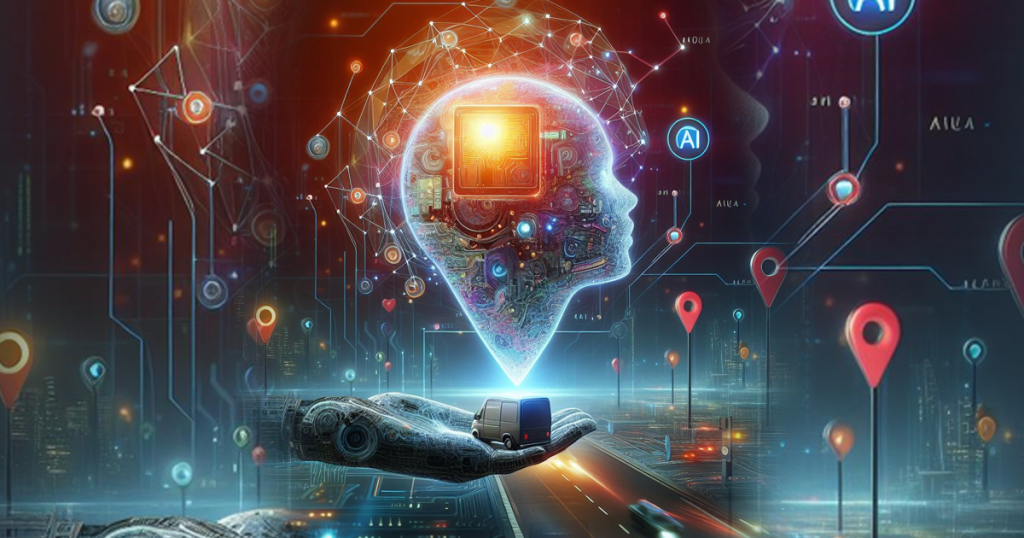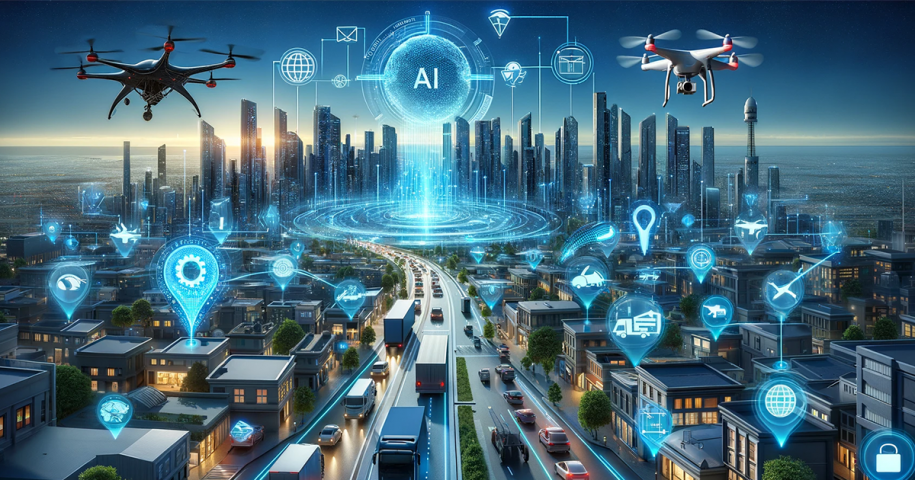The Power of AI: Revolutionizing GPS Tracking Systems
Welcome to the world of advanced GPS tracking systems powered by artificial intelligence (AI). In this digital age, AI is revolutionizing the way we navigate and track our surroundings. With the integration of AI technologies, GPS tracking systems have become more accurate, efficient, and versatile than ever before.
Harnessing the power of AI, these cutting-edge GPS tracking systems are capable of real-time tracking, predictive analysis, and seamless integration with other smart devices. Whether it’s monitoring a fleet of vehicles, ensuring the safety of loved ones, or tracking valuable assets, AI-powered GPS tracking systems offer unparalleled precision and peace of mind.
Gone are the days of relying solely on satellite signals. AI algorithms now analyze and interpret a multitude of data points, including traffic patterns, weather conditions, and historical data, to provide more precise and reliable navigation information. This means faster and more efficient routes, better decision-making, and ultimately, saving time and money.
How AI is revolutionizing GPS tracking systems

AI has transformed GPS tracking systems by enhancing their capabilities in numerous ways. Traditional GPS systems relied solely on satellite signals, often resulting in imprecise location data. However, AI algorithms now analyze and interpret a multitude of data points, including traffic patterns, weather conditions, and historical data, to provide more precise and reliable navigation information.
Real-Time Updates and Accurate Tracking
With AI, GPS tracking systems can now offer real-time updates and accurate tracking. AI-powered algorithms continuously process and analyze various data inputs to determine the most optimal routes, taking into account factors such as traffic congestion, accidents, and road closures. This real-time tracking capability enables users to make informed decisions and adapt their routes accordingly, saving time and minimizing disruptions.
Seamless Integration with Smart Devices
Moreover, AI has also enabled seamless integration with other smart devices, further enhancing the functionality of GPS tracking systems. For instance, AI-powered GPS trackers can communicate with smartphones, wearables, and even smart home devices, making it easier to monitor and track loved ones, vehicles, and valuable assets.
Benefits of AI-powered GPS tracking systems

The integration of AI in GPS tracking systems brings forth a plethora of benefits that significantly improve our daily lives.
Unparalleled Precision
Firstly, AI-powered GPS systems offer unparalleled precision. The algorithms used in these systems take into account a wide range of factors, such as traffic patterns, historical data, and even user preferences, to calculate the most efficient and accurate routes. This precision not only saves time and fuel but also reduces the overall carbon footprint.
Enhanced Security and Safety
AI-powered GPS tracking systems enhance security and safety. By continuously analyzing data inputs, such as traffic conditions and accident reports, these systems can provide users with real-time alerts and alternative routes, ensuring a safer journey. For fleet managers, AI-powered GPS tracking systems offer the ability to monitor driver behavior, detect potential risks, and take proactive measures to prevent accidents.
Improved Decision-Making with Predictive Analytics
Moreover, AI-driven predictive analytics play a crucial role in improving decision-making. By analyzing historical data and patterns, GPS tracking systems powered by AI can predict future trends, such as traffic congestion during peak hours or the likelihood of accidents in certain areas. This information enables users to make informed decisions and take proactive measures to optimize their routes and schedules.
AI algorithms for accurate tracking and real-time updates
One of the key advantages of AI-powered GPS tracking systems is their ability to accurately track and provide real-time updates. Traditional GPS systems relied solely on satellite signals, which were susceptible to interference and often resulted in imprecise location data. However, AI algorithms have changed the game by combining multiple data sources and analyzing them in real-time to provide accurate and reliable tracking information.
Leveraging Multiple Data Inputs
AI algorithms leverage a wide range of data inputs, including satellite signals, cellular network data, Wi-Fi signals, and even sensor data from the device itself. By combining and analyzing these data points, AI-powered GPS tracking systems can determine the device’s location with a high level of accuracy.
Continuous Real-Time Updates
Furthermore, AI algorithms continuously analyze and update location data in real-time. This means that users can rely on AI-powered GPS tracking systems to provide accurate and up-to-date information about their location, speed, and direction of travel. Whether it’s for personal navigation or fleet management, real-time updates are crucial for making informed decisions and ensuring a smooth and efficient journey.

Enhancing security and safety with AI in GPS tracking
AI-powered GPS tracking systems have revolutionized security and safety measures by providing real-time alerts and proactive risk management. By continuously analyzing various data inputs, such as traffic conditions, accident reports, and weather conditions, these systems can detect potential risks and provide users with real-time alerts and alternative routes.
Advanced Features for Driver Monitoring
In addition to real-time alerts, AI-powered GPS tracking systems also offer advanced features such as driver behavior monitoring. By analyzing data inputs from various sensors, such as accelerometers and gyroscopes, these systems can detect aggressive driving behaviors, such as harsh braking or rapid acceleration. Fleet managers can use this information to identify and address risky driving habits, ultimately improving driver safety and reducing the likelihood of accidents.
Furthermore, AI algorithms can also analyze data inputs from other devices, such as wearables or smartphones, to ensure the safety of individuals. For example, parents can use AI-powered GPS tracking systems to monitor the location of their children and receive real-time alerts if they stray from predetermined safe zones. This technology provides peace of mind for parents and enhances the safety of their loved ones.
Improving efficiency and productivity with AI in GPS tracking
AI-powered GPS tracking systems have a transformative impact on efficiency and productivity, particularly in industries such as logistics and transportation. By analyzing vast amounts of data, these systems can optimize routes, schedules, and resource allocation, ultimately improving operational efficiency and reducing costs.
Optimizing Delivery Routes
For instance, AI algorithms can analyze historical data on traffic patterns, delivery times, and customer preferences to optimize delivery routes. By considering factors such as traffic congestion, road conditions, and even weather forecasts, AI-powered GPS tracking systems can calculate the most efficient routes for delivery vehicles. This not only saves time and fuel but also improves customer satisfaction by ensuring timely deliveries.
Optimizing Resource Allocation
Furthermore, AI-powered GPS tracking systems can also optimize resource allocation. By analyzing data inputs such as vehicle availability, driver schedules, and delivery demand, these systems can dynamically allocate resources to meet customer demands in real-time. This proactive approach reduces idle time, maximizes resource utilization, and improves overall operational efficiency.

Conclusion: The transformative impact of AI in GPS tracking systems
In conclusion, the integration of AI in GPS tracking systems has revolutionized the way we navigate and track our surroundings. AI algorithms have enhanced the accuracy, efficiency, and versatility of these systems, enabling real-time tracking, predictive analysis, and seamless integration with other smart devices.
AI-powered GPS tracking systems offer unparalleled precision, enhanced security and safety measures, improved efficiency and productivity, and better decision-making through predictive analytics. While there are challenges and limitations to overcome, the future of AI-powered GPS tracking technology holds immense potential for further advancements.
As we continue to embrace the power of AI, we can look forward to a future where GPS tracking systems become even more intelligent, adaptive, and integrated. From smart navigation to autonomous transportation, AI will continue to shape the future of tracking technology, simplifying our lives and enabling us to navigate the world with precision and peace of mind.
Pictor Telematics: Leading the Way in GPS Tracking and Telematics Solutions

Leave a Reply